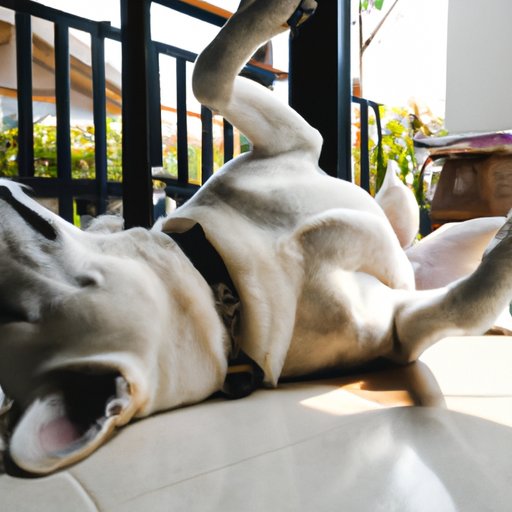Introduction
Dogs are wonderful companions and provide us with unwavering loyalty and love. As pet owners, we want to make sure our furry friends are safe and healthy, which is why it can be concerning to see them shaking while sleeping. Shaking in dogs can occur for a range of reasons, from medical issues to psychological factors. This article aims to explore the various causes of shaking in dogs during sleep and provide possible solutions to make your dog feel comfortable and relaxed.
Possible Medical Reasons That Can Cause Dogs to Shake in Bed
Shaking in dogs while sleeping can be an indication of an underlying medical condition. Pain from arthritis, injuries, or surgery can cause dogs to shake while sleeping. Neurological disorders such as seizures, tremors, or canine distemper virus can also trigger shaking in dogs. Additionally, muscle spasms, low blood sugar, and inner ear infections can cause your dog to shake.
It is important to pay close attention to your dog’s symptoms. If you notice other unusual behaviors or if shaking is paired with other symptoms like vomiting, drooling, or excessive drooping, this may indicate more severe health issues. In such cases, seeking veterinary attention is recommended.
Psychological Factors That Trigger Shaking in Dogs While Asleep
Just like humans, dogs can experience emotional distress that can lead to shaking while sleeping. Fear, anxiety, and stress can result in shaking. A sudden loud noise or a change in routine can trigger anxiety in some dogs. Post-traumatic stress disorder is also common in dogs and can occur when dogs experience a traumatic event like losing a companion or suffering abuse.
Owners must keep a watchful eye on their dogs’ mood and detect any noticeable changes. While some dogs can remain calm, others may experience a change in mood when placed in stressful situations, which can lead to shaking.
Encouraging your dog to have a sense of security can help a great deal in reducing shaking caused by anxiety. Create a safe and comfortable space for your dog to sleep and establish routines that your dog can rely on to increase their sense of security.
Understanding the Breed-Specific Characteristics of Dogs and Related Behaviors to Shaking
Some breeds are predisposed to shaking while sleeping due to their structural or behavioral characteristics. For example, small breeds like Chihuahuas may shake due to low blood sugar or cold temperatures. Breeds with thin skin like Greyhounds are also prone to tremors caused by the cold.
On the other hand, some dogs may engage in shaking behaviors during sleep due to their breed characteristics. For example, Vizslas, a high-energy breed, may shake during sleep after an intense exercise or play session.
Understanding breed-specific characteristics and related behaviors can help dog owners distinguish between benign shaking and more severe medical conditions.
Safety Tips for Dog Owners to Ensure Their Pets Stay Physically and Emotionally Comfortable During Sleep Time
As a dog owner, you can create a safe and comfortable sleeping environment for your furry friend. Encourage your dog to sleep in a designated space, free from hazards or potential threats. Avoid disturbing your dog’s sleeping environment with loud noises or sudden movements.
Establishing a sleep routine can provide your dog with a sense of safety and comfort. Consider providing your dog with a comfortable bed to sleep in, and discourage them from sleeping on surfaces that may cause discomfort, such as concrete floors.
Owners should monitor their dogs’ sleeping behaviors and pay attention to any sudden changes, such as appetite loss, vomiting, or lethargy. Regular exercise and spending time bonded with your dog can increase their physical and mental health.
Ways to Train Dogs to Avoid Shaking or Increase Relaxation During Sleep
There are various training techniques dog owners can use to help dogs relax and avoid shaking while sleeping.
Desensitization involves gradually exposing your dog to fearful situations and helping them cope with fear and anxiety. Positive reinforcement techniques, such as rewarding your dog for good behavior, can also help them feel more calm and secure while sleeping.
Aromatherapy is another effective approach to helping your dog relax. Scents like lavender, chamomile, and rose can create a calming effect on dogs and promote relaxation.
Personal Experiences of Dog Owners and their Beloved Pets Dealing with Shaking While Sleeping
Many dog owners have had experiences with their dogs shaking while sleeping. One owner reported that their dog was shaking due to a sudden loud noise that frightened her. The owner provided the dog with a calming environment by creating a designated sleeping space and providing her with warm blankets.
Another owner noted that their dog was shaking during sleep after being rescued from an animal shelter. The dog was experiencing anxiety due to the long-term effects of being in a stressful environment. The owner focused on creating a comfortable space with low stimulation during sleep time and provided positive reinforcement to ensure the dog felt more calm and confident.
Conclusion
Shaking while sleeping in dogs can be a concerning issue for pet owners. It is essential to understand the various reasons that can cause shaking, including medical and psychological factors. Additionally, recognizing breed-specific characteristics and implementing safety tips can ensure that your dog has a comfortable and safe sleeping environment.
Owners can use various training techniques to reduce shaking or increase relaxation during sleep. Through a combination of observation, understanding, and support, you can help your furry friend have peaceful and restful sleep.
